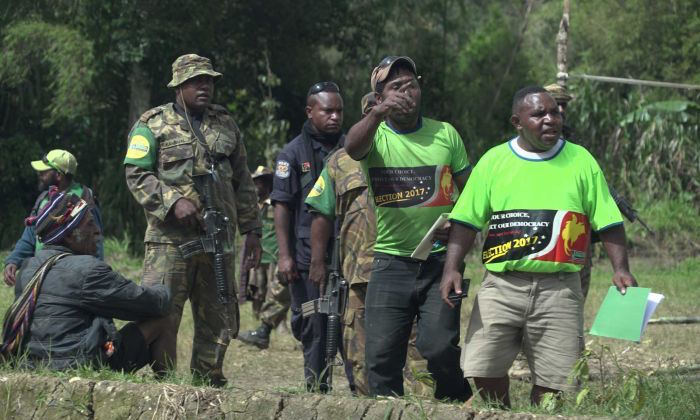
SOURCE: Charles Richardson / CRIKEY
Papua New Guinea, Australia’s former colony and nearest neighbour, has been going to the polls in a parliamentary election that concludes tomorrow. As is common in countries with major logistical challenges, voting has been staggered over a two-week period.
What’s not so common is the degree of sheer chaos being reported. Voting in the capital, Port Moresby, was aborted last week and re-run three days later, after polling staff went on strike and the election manager was arrested. According to the ABC, “Candidates say voters in areas hostile to the Government have been taken off the electoral roll, and there are documented incidents of ballot papers stolen and boxes destroyed.” The Guardian adds that “In the highlands ballot boxes had been stolen and destroyed, people were casting their votes without privacy in plain sight of officials and other voters, and fighting had broken out between rival clan groups and also between voters and police.”
The electoral commissioner is quoted as saying that voting is “progressing well” and that the election cannot be said to have failed because for that “there would have to be reports of ‘gross’ violence, and a majority of people prevented from voting” – which seems an extraordinarily lenient standard.
Opposition candidates allege that the problems have been mostly engineered to the advantage of the government of prime minister Peter O’Neill, which is not implausible, but poor management and poor infrastructure on their own could easily bear much of the responsibility.
Most of us are used to thinking of the evils of colonialism as being comfortably remote. Papua New Guinea challenges that complacency: it was Australia’s responsibility for most of the twentieth century, and we did a poor job.
That’s not to suggest that colonial administrators were not, in general, people of goodwill, or to understate the challenges that they faced. Papua New Guinea is difficult terrain on anyone’s account, with its fragmented geography and hundreds of different languages. But this is the peculiar arrogance of colonialism, to take on tasks that it is incapable of properly performing; it destroys indigenous structures and leaves nothing in their place.
If Australia had been serious about bringing Papua New Guinea into the modern world, we could have offered it statehood: Port Moresby is closer to Canberra than Perth is. With about seven million people, it would now be our second-largest state. But in the era of White Australia, that was an unthinkable proposition.
Instead, we implemented a rushed transition to independence in the 1970s, saddling the country with a top-heavy government of alien forms and a grossly inappropriate electoral system (more about that shortly).
It’s not as if Papua New Guineans are somehow genetically incapable of looking after themselves. On the contrary, they had a flourishing agricultural economy at a time when my ancestors were still sparse tribes of hunter-gatherers. But they now have a GDP per head that’s around one-twelfth of Australia’s.
So when an ABC headline asks “Why is Papua New Guinea’s election being ignored?”, part of the answer is that we find the topic embarrassing and rather hope it would just go away.
Another answer, however, is just that it’s so difficult to say anything meaningful about the election. An election preview usually starts with a recital of what happened last time, but there are no voting figures from the 2012 election. As Adam Carr reports, “No usable figures for this election have ever been published, and the PNG Election Commission has never responded to my request to provide them.”
I can tell you how many seats different parties won – since yesterday they’ve disappeared from the electoral commission website, but Wikipedia has them here – but that’s not terribly useful, since parties function as personal fiefdoms with little ideological or organisational coherence. MPs repeatedly move from party to party, and every government is in effect a collection of independents.
In its early days the system was chronically unstable, with nine changes of government in the first 27 years after independence. In the last fifteen years, however, there have been just two prime ministers – veteran Michael Somare and incumbent O’Neill – although the transition between them involved an exceptionally messy constitutional crisis in 2011-12.
From its common perception a decade ago as a “failed state” the country has actually recorded good economic growth in recent years, but governance is plagued by corruption and inefficiencies while the economy is hostage to the fortunes of the mining industry.
Parliament consists of 111 single-member districts: 89 allocated according to population, plus one at-large for each of the 22 provinces. Until 2007, voting was first-past-the-post (the system bequeathed by the Whitlam government), which, given the lack of strong parties, rudimentary communications and multiplicity of local candidates, made representation a lottery.
The system was then changed to limited preferential voting: voters are required to express three, and only three, preferences. It’s hard to see that as much of an improvement, given the huge numbers of candidates involved. In 2007 by my count there were 2,609, an average of more than 23 per seat; this time, according to the electoral commission, there are 3,340, or 30 per seat.
It has also presumably increased the number of informal votes, although the absence of proper statistics leaves this a matter of doubt.
In any case, the results will bear only indirectly on the fate of O’Neill’s government, which will depend on the usual horse-trading among the new MPs. And Australia, no doubt, will continue to look the other way.
- ACTNOW's blog
- Log in to post comments
